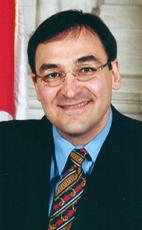Mr. Speaker, you will understand that, having listened to such ridiculous remarks, remarks that have nothing to do with the reality and are in fact an insult to the intelligence of Canadians, I just had to respond.
The subject of transfer payments was raised earlier; I will just touch on it because I know that we are short on time. In discussing this issue of federal transfers to the provinces, the people opposite fail to mention that the Quebec finance minister had made forecasts regarding transfer payments and that those announced in the budget speech are $600 million higher than anticipated by the Quebec government.
They fail to mention that, for the very first time, a Canadian government has had the courage to develop a five-year plan to ensure stable, and not just stable, but progressively higher transfer payments by establishing a cash transfer threshold.
They also fail to mention, which is unfortunate, that equalization payments keep growing from year to year and that the province of Quebec greatly benefits from these payments. The subject of employment was also raised, to complain about the lack of employment measures.
You will understand how staggering it is for me to hear such a thing, given the fact that the federal government's role is to form partnerships and create a climate conducive to good investment. Deficit reduction fosters job creation. Technology Partnerships Canada, the program announced by my colleague from Industry Canada, is much appreciated by Canadian industry and small business. And so is the program geared toward young people; $315 million are allocated to this program. There is also the export financing program involving the Export Development Corporation.
These are measures which prove that the government is headed in a direction leading to the development of a sustainable economic safety net that will foster the creation of steady jobs.
To conclude, regarding the employment insurance, the amounts that will be set aside as a result of the proposed reform will be invested in this employment insurance, to maintain stable contributions and build a reserve to sustain this stability even through an economic recession. It should also be pointed out also that this
government is the first government to hit its 3 per cent of GDP deficit reduction target. Those are the real figures.

